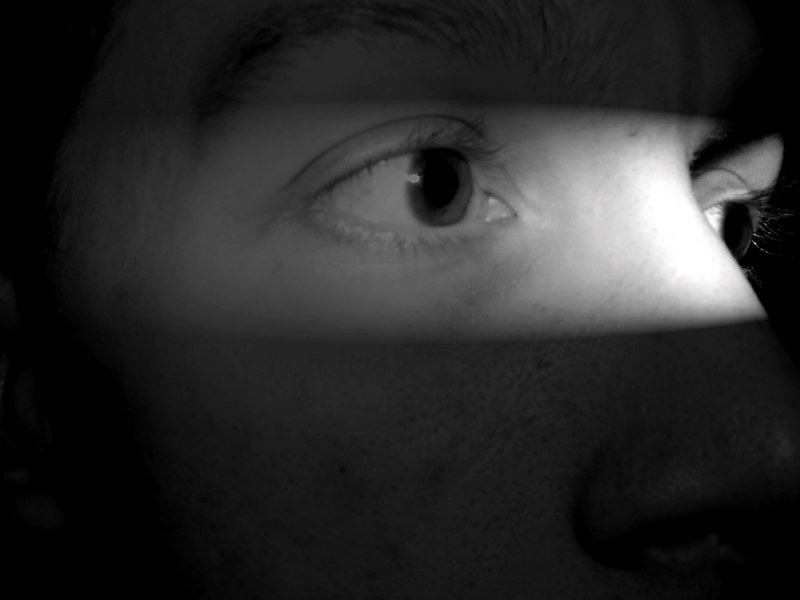Joelle Cantrell’s Fanfiction
By Holly A. Stovall
Until the paper that Joelle Cantrell wrote made it to the top of my stack of To Kill a Mockingbird essays to grade for sophomore English at Jackson High, I had been eating clean and feeling good. I was slouching deep into the couch, a pint of Clean Cream sugar-free-non-fat frozen balanced on a dictionary by my side. Only a few more papers were left in the stack, and then I would be free to hide away upstairs to write fanfiction. I loved to teach Mockingbird, but then I read Joelle’s first sentence, and an unease creeped up around my skin, like hives.
I’ll show you what Joelle turned in, and you’ll see why I’m unnerved, but if you love Mockingbird like I do, if you voted it the best freakin’ novel ever written, like the readers in all those fancy national polls, then don’t get too involved.
So Close to Her Momma in Heaven
By Joelle Cantrell
Last week, Bob Ewell held a pillow on his daughter’s face until she passed out. Sometimes he puts his hands around her neck, but means only to injure her, so he doesn’t squeeze as hard as he could, and he doesn’t leave bruises in front, where people would see, not that anyone would care. Sometimes, Mayella has to leave the house to run an errand in town, and folks might hate Bob even more if they saw bruises on his grown daughter’s neck, but their hate for him doesn’t transfer to protection for her. She doubts he’ll go to jail if she dies, because he didn’t even get arrested after he knocked Mayella’s momma’s head hard against the stove. He doesn’t know Mayella was watching that night. The sheriff came to investigate, Bob said it was an accident, and there was no murder charge. Weren’t ever any drama. Weren’t ever any trial.
Today, when Bob orders Mayella to chop up a chiffarobe, she doesn’t tell him she’s too tired. If she does, he’ll hit her. But it’s like the life is spilling out of her because last night all kinds of blood had been letting down, more than the monthly, more pain, bigger clumps. She would have loved her own baby to nurse, but it’s just as well it miscarried, as she can barely take care of the kids Daddy had with Momma.
Over a year ago, the little ones started begging Mayella to take them for ice cream, so she saved up, and then, finally, when she had enough for each child, she made them wash and put their shoes on and they were about ready to leave, when Daddy ordered Mayella to do some chore. He’d done this a handful of times, and the kids were disappointed when Mayella told them “not today” after all.
So finally, now, they ask again, and Mayella is fixing to take them, the thought of it cheering her up, but her daddy tells her to chop up the chiffarobe for firewood, so she just sighs and gives the kids the nickels she’d been saving and tells them not to lick down the ice cream too fast or they’ll get a headache, and to come straight home afterwards. There’s an extra nickel, the one for Mayella’s cone, and she keeps it.
The children leave and she’s inside swinging this hatchet into the middle of the chiffarobe, trying to splinter it, but it’s tough, hard wood. The hatchet gets stuck, and she lets it hang there while she catches her breath and rests her arms. She needs a nap, but her daddy will kill her if she don’t get that thing out the door before he gets back. He means to kill her dead. If not today, then tomorrow or next week. She needs to gather her strength, so she goes to sit on the front steps a moment, and that’s when Tom Robinson comes by and tips his hat.
She calls to him, asking if he’d please loosen up the chiffarobe into small enough parts that she can carry them outside.
“My daddy kill me if it ain’t done when he get back,” she says.
Everybody knows her daddy’s mean as a junkyard bitch.
Tom Robinson nods and turns to the house. Mayella goes in first and holds the door open for him to follow. She says, “Just chop it up small enough so it fits through the door. Then be on your way. I got a nickel for you.”
“I won’t take your nickel, mam,” Tom Robinson says.
She tells him he might as well take it, seeing she has no use for it now that the kids have gone on for ice cream without her. He says to save it for next time, and her eyes water, like she’s going to cry, because not since her momma died has anyone been kind. She knows she’s not supposed to like no colored man, but his voice is warm, like sunlight in winter.
Tom Robinson turns to the chiffarobe with the hatchet still stuck in it. Mayella gets a good look at his arms, how the one hangs there and the other pulls the hatchet out of the chiffarobe, like picking wildflowers in a field. He swings the hatchet with his good arm, and the wood gives way. He circles around the chiffarobe, moving his arm, high and low, and she watches chunks of wood splinter and fall.
She doesn’t know when her daddy’s coming back, and it wouldn’t do for Tom Robinson to be there when he does, so she says, “Thank you, I can take it from here.” She’s not sure that she’ll be able to finish on her own, but she’ll do her damnedest.
She stretches her hand towards him to take the hatchet, and then it just happens. She rests her forehead on his chest. “Just let me rest my head here a moment, Tom Robinson. Just for a moment,” she says, and he lets her. She closes her eyes and cries. Tears come when you don’t expect it and can’t explain it. “My daddy, my daddy does things to me,” she says.
Suddenly, Tom Robinson bolts out the door and leaves her standing, staggering. When she looks up, her daddy’s fist meets her face, knocking her to the floor. Then he gets on top of her and squeezes her neck, front and back. While he’s squeezing, she feels so close to her momma in heaven. She sees her momma’s face in a light. Her momma is the light. She passes out and when she wakes up, Daddy’s poking her with his thing, saying, “God damn bloody bitch.”
She hasn’t escaped this life yet, and it’s just as well because she promised her mamma she’d take care of the kids and the gardenias. Her daddy gets up and disappears out the door and Mayella lies there, trying to muster a drop of strength. When he comes back, the sheriff’s with him.
“See them damn bruises all over her neck and face. That’s what that colored boy did to her,” except Bob Ewell uses the vulgar term for colored people. Mayella’s momma told her the n-word was wrong, because Jesus says to treat your neighbor as yourself.
Weeks pass, then months. Mayella gains some strength back. Bob hasn’t beat her since that day. There’s going to be a trial at the fancy courthouse. Her daddy tells her she’s going to speak to a judge in front of an audience, and all she has to say is that Tom Robinson took advantage of her. He uses the word “rape,” and she figures that it means it’s when a colored man puts his thing in you. If her daddy does it, it’s just him being a daddy, and not a crime.
Her daddy takes her to town to meet with a man in a suit, Mr. Gilmer.
“Mayella, we’ve got to rehearse. Atticus is rehearsing with Tom Robinson, and you will practice with me. Now, pretend I’m the judge, and that’s Tom Robinson in that chair.” Mr. Gilmer points to an empty chair.
Mayella nods.
“Point to the man who hit your face, strangled your neck, and raped you,” Mr. Gilmer says.
Mayella slowly raises her hand towards the empty chair.
Bob Ewell stands and stomps his foot. “Ain’t nobody believe her! Mayella, you got to show’em. You been wronged, violated. You got to get upset.”
They rehearse until Mr. Gilmer and Bob Ewell are satisfied.
The day of the trial, Mayella finally steps inside the courthouse, with its towering ceiling, polished wood, and white paint. It has a balcony upstairs, like an opera house. Folks are dressed up, like they’re there for a show. Scout Finch, Harper Lee’s little narrator, paints Mayella as entirely uncultured and illiterate, but Mayella knows more than she lets on, and she’s read about opera houses.
The courthouse is packed, colored people upstairs and the white ones below. The white ones want to hear the lie her daddy is making her tell. The white folks, she thinks, ain’t never wanted to help her or her momma, even though she’s white like them, but she’s dirt poor, living at the edge of the trash dump and next door to the colored folks. She’s invisible to the people in town, with their sidewalks and porch swings, their living rooms with couches, their kitchens with tables. But they know how mean her daddy is. They know her momma’s death was never explained, and if they didn’t care that her momma died, they won’t care if she does.
Still, she don’t like to say anything against Tom Robinson, but if she doesn’t do what her daddy says, he’ll kill her. And he means to kill her dead.
They’re calling her over to a chair by the wooden box that contains the judge. Mayella’s daddy is staring her down with his most onery face, like a rabid dog. It makes her freeze.
• • •
Scout wasn’t there to witness the event in Bob Ewell’s house, but she was at the courthouse and can tell it from here.
Scout sees the court paint Mayella as an oversexed hussy. Today we call it victim blaming. Well, I’m sorry, but f*ck Harper Lee, because it’s not that simple.
Court’s a place for the men and their laws and punishments. It doesn’t have anything to do with getting to the truth of the danger Mayella’s in, only with the story folks want to hear and tell.
The essay assignment asks for evidence, but what’s the point of evidence if the wrong man’s on trial?
P.S. Dear Mrs. Raulston, I know you take off points for postscripts because “they take the reader out of the narrative,” so let me just say that this is the narrative. Look up. Did you know that more than three women and girls a day die from domestic violence? That’s every day, year after year. A fourth of all girls sustain gender-based violence before age 19, and more than a third of women during their lifetimes. The World Economic Forum calls gendered violence a pandemic. Also, like, 97 percent of the people who report rape are telling the truth, but you make us read about the one who lies. Do you want us to believe the girls who report are lying? We’re not supposed to believe Mayella or any victim? Is that why the principal didn’t take Kayla seriously when she reported to him that she was sexually assaulted in the band room? Are you teaching male superiority?
“No,” I said, though there was nobody nearby to hear me. The word “no,” irritating and itchy, vibrated in my throat. I’d told the class not to turn in fanfiction. I started to write “Re-do” at the top of Joelle’s paper but got only as far as “R” before scratching it out. Something about Lee’s novel now nagged at me, as if I couldn’t keep reading it as I had before. A murky sense of betrayal was sinking down from my throat and into my gut, hot and awful. I needed to sooth it away, but the melted Clean Cream was bitter.
I slid Joelle’s paper under the others, padded into the kitchen, and dug around the back of the freezer until I found a pint of Chocolate Chip Cookie Dough ice cream. Just one spoonful would be enough, but it soothed me so much that I wrapped my mouth around another and another. The cold sweet cream dissolved my momentary doubts about Mockingbird. I leaned on the counter, giving in, until only a puddle was left in the carton, which I then tossed in the trash.
I fished Joelle’s story out of the bottom of the pile and wrote “A” at the top, not for her, but for me, as in “A” for ancient history, meaning I didn’t have to think about it anymore, and I wouldn’t have to try to teach teenagers about domestic violence in literature. This way, Joelle wouldn’t protest her grade or complain to her mom, who would complain to me and then to the principal. The mom would write an Op Ed for the newspaper. There might be a culture war. Instead of all that craziness, I planned to go on teaching Mockingbird as I always had, not calling attention to the crimes against Mayella. It will be as if I’d never read Joelle Cantrell’s fanfiction.
Holly A. Stovall (she, her), a new editor at Writers Resist, is writing a thesis for her MFA in Creative Writing at Northwestern University’s School of Professional Studies. She has an MA in Women’s History and a PhD in Spanish Literature. For over a decade, she taught Women’s Studies at Western Illinois University, where she earned tenure, but her career as a feminist academic ended when a neoliberal governor starved WIU of funding. Despite being one of the most diverse and economically successful departments in the university, the Department of Women’s Studies was closed, and her position eliminated.
Since leaving academia, Holly has gone on to publish fiction and creative nonfiction in LitBreak Magazine, Writers Resist, and the Mid/South Anthology. For her MFA thesis, she’s writing a memoir about the grief of her layoff and the space she finally gave herself to fully grieve her losses. She lives in Macomb, Il, with her husband, son, and standard poodle, but visits Chicago regularly. Visit her website at HollyAWrites.com.
Photo credit: Jimmy Emerson, DVM, via a Creative Commons, license.
A note from Writers Resist
Thank you for reading! If you appreciate creative resistance and would like to support it, you can make a small, medium or large donation to Writers Resist from our Give a Sawbuck page.
















